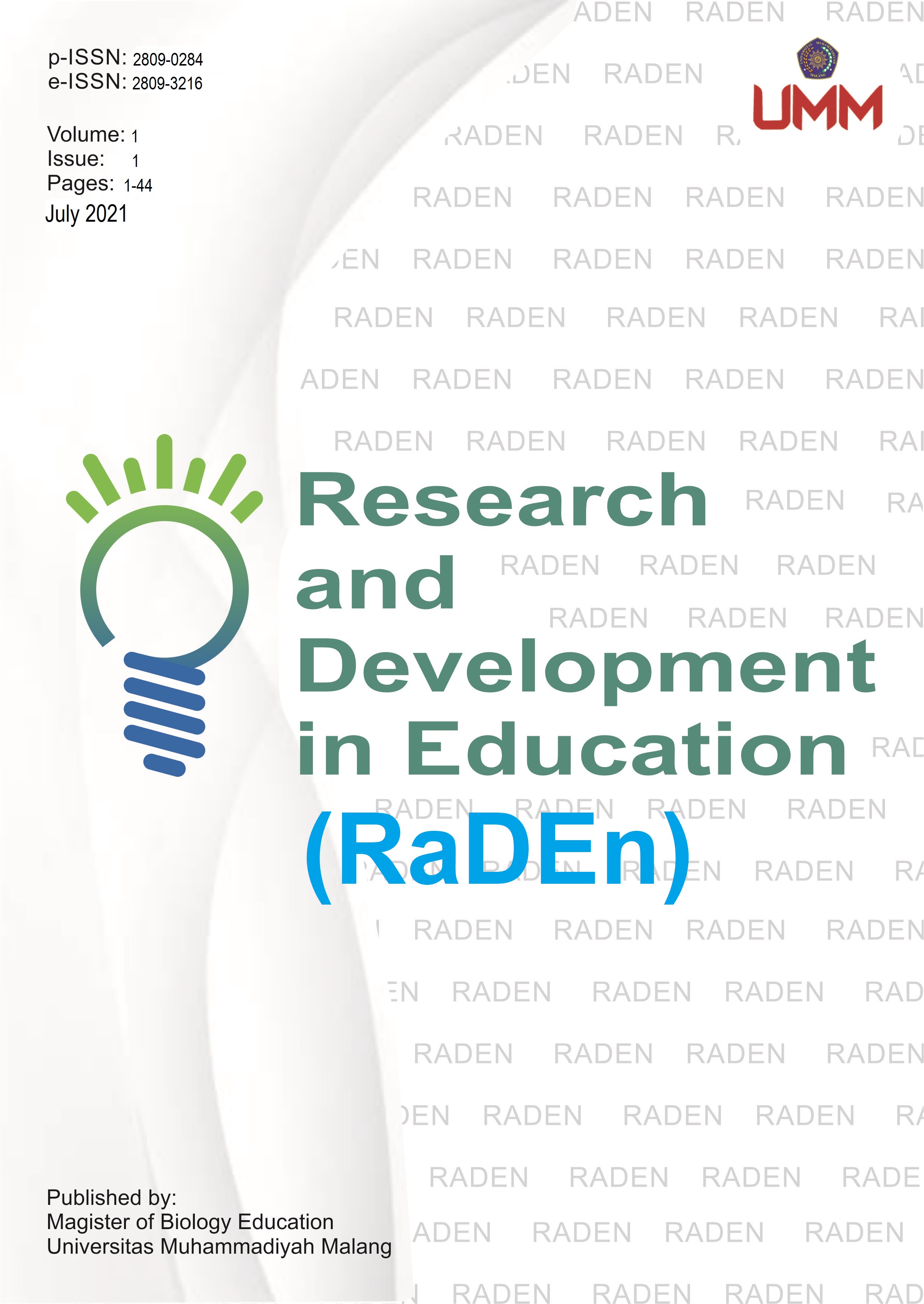Development of monopoly mite game as a health promotion media to increase knowledge and understanding about house dust mites in student boarding house
DOI:
https://doi.org/10.22219/raden.v1i1.18492Keywords:
Mite game monopoly, Health promotion media, house dust miteAbstract
Student’s knowledge of house dust mite (TDR) is still limited as well as the learning media used are uncomplicated. However, aside from learning outcome, knowledge of environmental health and hygiene are ignored. This study aims to produce health promotion media and analyze the effectiveness. This type of study was conducted by Research and Development (R&D) modified model by Borg & Gall. Data were collected from material expert, media expert, and extensive trial (experiments) that involving 30 students of Biology education department who have taken parasitology courses. As data analysis uses paired t-test (paired sample t-test). The result of the Mite Game Monopoly health media promotion products shows the validation of media experts and material experts are categorized very well with percentages of 97% and 89%. The result of data analysis obtained a value P < 0.05 which means there is a significant difference in the average value of pretest and posttest, it shows an increase of knowledge and understanding of TDR between before and after using the Mite Game Monopoly media.
Downloads
References
Afandi, R. (2015). Pengembangan Media Pembelajaran Permainan Ular Tangga Untuk Meningkatkan Motivasi Belajar Siswa dan Hasil Belajar IPS di Sekolah Dasar. JINoP (Jurnal Inovasi Pembelajaran), 1(1), 77. https://doi.org/10.22219/jinop.v1i1.2450
Akbar, S. (2013). Instrumen perangkat pembelajaran (1st ed.). PT. Remaja Rosdakarya.
Arikunto, S. (2010). Metode peneltian. Jakarta: Rineka Cipta.
Arikunto, & Suharsimi. (2013). Prosedur Penelitian Suatu Pendekatan Praktik. Jakarta: Rineka Cipta.
Batubara, M. S. (2017). Hasil uji coba video pembelajaran mata kuliah kultur jaringan berbasis masalah pada dosen dan mahasiswa program studi pendidikan biologi UMTS. Jurnal Pendidikan Biologi, 6(2), 44–52. https://doi.org/10.24114/jpb.v6i2.6544
Indriyanti, W. (2018). Hubungan faktor internal dan eksternal terhadap Jumlah Tungau Debu Rumah (TDR) dalam kamar kos mahasiswa di desa Landungsari Dau Malang. Universitas Muhammadiyah Malang.
Natalia, D. (2015). Peranan alergen tungau debu rumah ( Der p 1 dan Der p 2 ) dalam reaksi alergi. https://docplayer.info/35138596-Peranan-alergen-tungau-debu-rumah-der-p-1-dan-der-p-2-dalam-reaksi-alergi.html.
Notoatmodjo. (2010). Promosi kesehatan teori & aplikasi. Rieneka Cipta.
Nugroho, S. (2014). Pemanfaatan Mobile Learning Game Barisan dan Deret Geometri untuk Meningkatkan Minat dan Hasil Belajar Matematika SMA Kesatrian 1 Semarang. Indonesian Digital Journal of Mathematics and Education, 1(1), 1–7.
Rofieq, A. (2018). Pengelolaan debu, rumah berbasis biologi lingkungan, mengurangi kadar alergen dan menghindari penyakit yang bersumber dari debu rumah. UMM Press. https://eprints.umm.ac.id/60761/
Rofieq, A., Latifa, R., & Fatmawati, D. (2016). The content of various domestic microbes and their correlation to inhalant allergen in house dust between urban and rural residents in Malang Raya Indonesia. Jurnal Teknologi, 78(5). https://doi.org/10.11113/jt.v78.8331
Sukmadinata, R. (2015). Metodologi Penelitian Pendidikan. In Metodologi Penelitian Pendidikan. PT Remaja Rosdakarya.
Sukmadinata, S. N. (2005). Metode penelitian. Bandung: PT Remaja Rosdakarya.
Downloads
Published
How to Cite
Issue
Section
License
Copyright (c) 2021 Arifah et al

This work is licensed under a Creative Commons Attribution-ShareAlike 4.0 International License.
Authors who publish with Research and Development in Education agree to the following terms:
- For all articles published in the Research and Development in Education, copyright is retained by the authors. Authors give permission to the publisher to announce the work with conditions. When the manuscript is accepted for publication, the authors agree to the automatic transfer of non-exclusive publishing rights to the publisher.
- Authors retain copyright and grant the journal right of first publication with the work simultaneously licensed under a Creative Commons Attribution-ShareAlike 4.0 International License that allows others to share the work with an acknowledgment of the work's authorship and initial publication in this journal.
- Authors are able to enter into separate, additional contractual arrangements for the non-exclusive distribution of the journal's published version of the work (e.g., post it to an institutional repository or publish it in a book), with an acknowledgment of its initial publication in this journal.
- Authors are permitted and encouraged to post their work online (e.g., in institutional repositories or on their website) prior to and during the submission process, as it can lead to productive exchanges, as well as earlier and greater citation of published work (See The Effect of Open Access).

This work is licensed under a Creative Commons Attribution-ShareAlike 4.0 International License.








